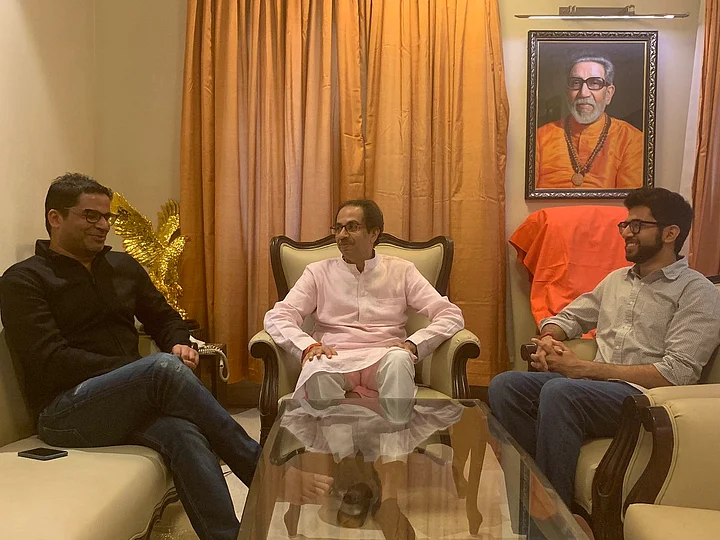Janata Dal (United) Vice-President and political strategist Prashant Kishor met Shiv Sena President Uddhav Thackeray at the latter’s residence Matoshree in Mumbai on Tuesday, 5 February. Shiv Sena Youth Wing President Aditya Thackeray was also present at the meeting, which is said to have lasted over an hour. After the meeting, Kishor tweeted that he “looks forward to joining forces” with the Sena in Maharashtra “as part of the NDA.”
Despite Kishor downplaying the meeting, reports suggest that he is likely to help the Sena in its campaign for the upcoming Lok Sabha elections and the Maharashtra Assembly polls later this year.
An additional possibility is that he met Thackeray as the emissary of Bihar Chief Minister Nitish Kumar to create a pressure group within the National Democratic Alliance (NDA). His tweet above, in which he tags Nitish Kumar, seems to indicate as much.
Also, given Nitish Kumar's revelation that he inducted Kishor on the advise of BJP President Amit Shah, the entire exercise could just be an attempt to strengthen the NDA.
Kishor’s organisation – Indian Political Action Committee – was part of a number of successful campaigns, all of which were personality-oriented: Narendra Modi’s campaign in the 2014 Lok Sabha elections, the Nitish Kumar-led Mahagathbandhan’s campaign in the 2015 Bihar Assembly elections and Captain Amarinder Singh’s campaign in the 2017 Punjab elections. He was also involved in the Congress’ campaign in Uttar Pradesh in 2017, which proved to be disastrous.
Since 2017, he has also been working with the Jaganmohan Reddy-led YSRCP in Andhra Pradesh, and continues to advise the party even after he joined the JD(U) as its vice-president in September 2018.
Being the de-facto second-in-command of the JD(U) and having a strategic association with two other regional parties – the YSRCP and Shiv Sena – Kishor is emerging as a key player in the Lok Sabha elections. There is a possibility that these parties could emerge as a bloc after the elections, especially if the BJP’s tally reduces substantially. In that eventuality, Kishor’s role would become extremely crucial.
Let’s take a look at how well the three parties Kishor influences could do in the 2019 elections.
According to the C-Voter survey conducted in January 2019, these three parties could win around 40 seats in the upcoming Lok Sabha elections. In 2014, they had won 29 seats. So while the BJP is almost certain to lose ground, these three regional parties put together are on the rise. Much of the increase is coming from the JD(U) in Bihar and the YSR Congress Party in Andhra Pradesh.
If the BJP and the Shiv Sena form a pre-poll alliance in Maharashtra, this tally of 40 could increase even further. Another party which could be part of this axis is the Telangana Rashtra Samithi, which has a tacit understanding with the YSRCP in the two Telugu-speaking states. While the Biju Janata Dal is another possibility, Naveen Patnaik has kept his cards extremely close to his chest and it is not certain what his post-poll position is going to be.
There are Three Possibilities for This Bloc of Parties
- If the BJP and all the other NDA constituents, barring Shiv Sena and JD(U), fail to cross 230 seats, these three parties could emerge as an important bloc that will drive a major bargain from the BJP in several ways. These three parties have very clear political priorities as well: YSRCP and JD(U) want special status for Andhra Pradesh and Bihar respectively; and the Shiv Sena wants to become the senior alliance partner in Maharashtra so any deal with the BJP would involve a bigger share in the Assembly elections.
- If the BJP’s tally falls below a certain threshold, say 180 seats, these parties could easily back a formation dominated by regional parties, supported from the outside by the Congress or the BJP. Given Kishor’s proximity to the Bihar chief minister, Nitish Kumar could very well be pitched as the head of such a formation.
- Then there is an outside chance of these parties supporting a Congress-led government in case the grand old party does exceptionally well.
Of course, this is still within the realm of speculation. There are certain caveats we need to keep in mind. For instance, while the YSRCP is being considered a potential ally for the BJP, we must remember that the party wanted to bring a No Confidence Motion against the Narendra Modi government in 2018. And given the YSRCP’s reliance on Dalit, Muslim and Christian votes, it would not be easy for the party to openly align itself with the BJP. Also, the party wouldn’t be averse to supporting the Congress if it gives special status to Andhra Pradesh.
Having said that, Kishor’s meeting with Shiv Sena is significant. As of now, the Sena and JD(U) are two parties which are stuck with the BJP because they don’t seem to have any other choice – the JD(U) burnt its bridges with the anti-BJP forces after it walked out of the Mahagathbandhan in Bihar in 2017, and the Shiv Sena is a bit of an untouchable for the Opposition because of its Hindutva credentials.
Therefore it isn’t surprising that Kishor is acting as a link between the two. In any of these eventualities, watch out for Kishor, who will be a key player – both during the elections and after the results.
